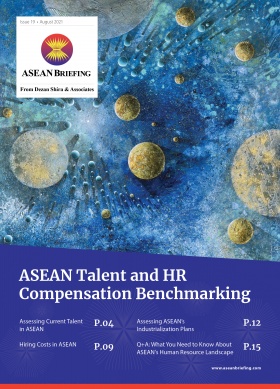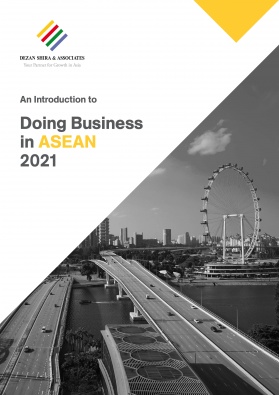The ASEAN-Russia Trade and Investment Cooperation Roadmap
ASEAN and Russia have adopted an updated ASEAN-Russia Trade and Investment Cooperation Roadmap, as the two sides seek to stimulate a post-pandemic economic recovery.
The revised ASEAN-Russia Trade and Investment Cooperation Roadmap (the “Roadmap”) was agreed upon on September 14, 2021, at the 10th ASEAN-Russia Economic Ministers’ Meeting. The revision comes at a time when both Russia and much of ASEAN are struggling with surges in COVID-19 cases and are looking to develop new avenues for growth.
The Roadmap is an agreement that aims to promote dialogue on trade-related issues between ASEAN and Russia. As opposed to a trade deal with concrete stipulations, the Roadmap seeks to set up the institutions for the two sides to deepen trade relations – potentially setting the stage for future trade agreements.Here, we offer an overview of the Roadmap and its implications for ASEAN-Russia trade and investment.
What are the goals of the Roadmap?
The original Roadmap, endorsed at the 44th ASEAN Economic Ministerial Meetings in 2012, lays out the document’s principles and objectives. These build on the Agreement on Economic and Development Cooperation between the Governments of the Member Countries of ASEAN and the Government of the Russian Federation, created in 2005.
The Roadmap has an “overall objective” of institutionalizing a comprehensive dialogue mechanism on trade-related issues to promote cooperation in areas of mutual interest to ASEAN and Russia. In pursuit of this goal, the Roadmap seeks to:
- Develop a favorable environment for the promotion of trade and investment between ASEAN and Russia;
- Encourage cooperation in areas of mutual interest related to investment and trade in goods and services to facilitate trade and investment flows; areas of concentration include technical regulations, standards and conformity assessment procedures, sanitary and phytosanitary measures, trade remedies, intellectual property, and e-commerce; and
- Develop cooperation in other areas of mutual interest, including the development of small and medium-sized enterprises (SMEs), science and technology, energy, finance and banking, agriculture, healthcare, transportation, information and communication technologies, human resources development, tourism, and environment.
In addition to these areas, the Roadmap states that it will take into account opportunities for cooperation in support of the Master Plan on ASEAN Connectivity, with a goal to support regional integration and reduce gaps in development with less developed ASEAN members. Accordingly, the Roadmap states that the less developed countries of Cambodia, Laos, Myanmar, and Vietnam should receive differential treatment.
Similarly, the Roadmap also aims to encourage the development of Siberia and the Russian Far East. These regions are less developed than “European Russia” and stand to benefit from greater integration with Asia.
What does the Roadmap do in practice?
To implement the Roadmap’s goals in practice, the document highlights five action areas. These are:
- High-level policy dialogue: Providing overall policy direction to enhance ASEAN-Russia economic relations, such as through annual ASEAN Economic Ministers-Russia Consultations.
- Consultations at the Senior Economic Officials level: Overseeing the implementation of economic cooperation programs and activities; exchanging views on ASEAN dialogue with economic cooperation partners; providing a forum for discussing issues of mutual interest; and supporting the ASEAN Economic Ministers-Russia Consultation process.
- Sectoral dialogues between ASEAN and Russian officials: Sharing best practices, experience, and expertise, and discussing possible joint cooperation on mutually agreed priority areas, including agriculture, energy, logistics, industry, innovation, human resources, tourism, and SME development.
- Trade and investment facilitation: Promoting transparency and information sharing on matters relevant to trade and investment between ASEAN and Russia; pursuing activities that would enhance trade and investment, and enhancing investment facilitation.
- Enhancing dialogue with business: Encouraging business dialogue between ASEAN and Russia at the business-to-business and business-to-government levels to raise awareness of trade and investment opportunities, and seeking private sector inputs in identifying trade barriers.
The exact mechanisms of accomplishing the above tasks depend on the activity. Generally speaking, they include meetings, seminars, workshops, symposiums, and other forums designed to facilitate dialogue.
What is next for the ASEAN-Russia Roadmap?
During ASEAN-Russia consultations in September 2021, the two sides adopted a revised Roadmap and ASEAN-Russia Trade and Investment Cooperation Work Program. While the details of these updated agreements remain to be seen, ASEAN and Russian officials emphasized their importance for post-pandemic recovery.
Upon adopting the agreement, Russia’s Deputy Minister Vladimir Ilyichev, the country’s representative at the consultations said, “The pandemic has demonstrated that we can overcome the crisis only by means of scaling up cooperation in three key areas – trade and investment, digital economy, and sustainable development.”
Sectors highlighted in the updated agreements include trade and industry; micro-small enterprises and SMEs; sci-tech, innovation, and intellectual property; and climate change, energy, transportation, agro-fisheries, tourism, culture, human resource development and health care, sustainable development, and digital economy.
The sectors emphasized by the revised Roadmap suggest that ASEAN and Russian officials see forward-looking industries, namely in digitalization and sustainability, as the future of economic cooperation.
About Us
ASEAN Briefing is produced by Dezan Shira & Associates. The firm assists foreign investors throughout Asia and maintains offices throughout ASEAN, including in Singapore, Hanoi, Ho Chi Minh City, and Da Nang in Vietnam, Munich, and Esen in Germany, Boston, and Salt Lake City in the United States, Milan, Conegliano, and Udine in Italy, in addition to Jakarta, and Batam in Indonesia. We also have partner firms in Malaysia, Bangladesh, the Philippines, and Thailand as well as our practices in China and India. Please contact us at asia@dezshira.com or visit our website at www.dezshira.com.
- Previous Article Hiring Costs in ASEAN
- Next Article The ASEAN-Russia Trade and Investment Cooperation Work Program







